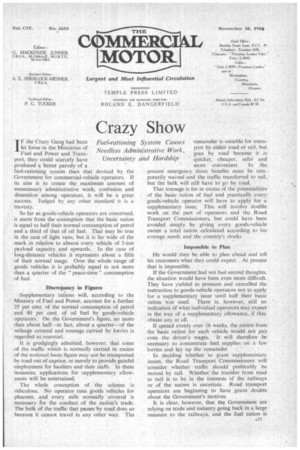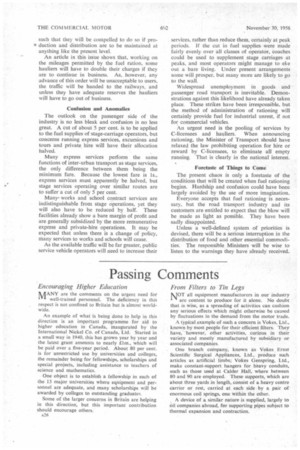Crazy Show
Page 27

Page 28

If you've noticed an error in this article please click here to report it so we can fix it.
IF the Crazy Gang had been let loose in the Ministries of Fuel and Power and Transport, they could scarcely have produced a better parody of a fuel-rationing system than that devised by the Government for commercial-vehicle operators, If its aim is to create the maximum amount of Unnecessary administrative work, confusion and dissension among operators, it will be a great success. Judged by any other standard it is a travesty.
So far as goods-vehicle operators are concerned, it starts from the assumption that the basic ration is equal to half their normal consumption of petrol and a third of that of oil fuel. That may be true in the case of light vans, but it is far wide of the mark in relation to almost every vehicle of 3-ton payload capacity and upwards. In the case of long-distance vehicles it represents about a fifth of their normal usage. Over the whole range of goods vehicles it is probably equal to not more than a quarter of the " peace-time " consumption of fuel.
Diserei)ancy in Figures Supplementary rations will, according to the Ministry of Fuel and Power, account for a further 25 per cent. of the normal consumption of petrol and 40 per cent. of oil fuel by goods-vehicle operators. On the Government's figure, no more than about half—in fact, about a quarter—of the mileage covered and tonnage carried by lorries is regarded as essential.
It is grudgingly admitted, however, that sonic of the traffic which is normally carried in excess of the notional basic figure may not be transported by road out of caprice, or merely to provide gainful employment for hauliers and their staffs. In these instances, applications for supplementary allowances will be entertained.
The whole conception of the scheme is ridiculous. No operator runs goods vehicles for pleasure, and every mile normally covered is necessary for the conduct of the nation's trade. The bulk of the traffic that passes by road does so because it cannot travel in any other way. The remainder is suitable for transport by either road or rail, but goes by road because it is quicker, cheaper, safer and more convenient. In the present emergency those benefits must be temporarily waived and the traffic transferred to rail, but the bulk will still have to go by road.
That tonnage is far in excess of the potentialities of the basic ration of fuel and practically every goods-vehicle operator will have tO apply for a supplementary issue. This will involve double work on the part of operators and the Road! Transport Commissioners, but could have been avoided simply by giving every goods-vehicle owner a total ration calculated according to his average needs and the country's stocks.
Impossible to Plan He would then be able to plan ahead and tell his customers what they could expect. At present that is impossible.
If the Government had not had second thoughts, the situation would have been even more difficult. They have yielded to pressure and cancelled the instruction to goods-vehicle operators not to apply for a supplementary issue until half their basic ration was used. There is, .however, still no indication of what individUal operators may expect in the way of a supplementary allowance, if they obtain any at all. .
If spread evenly over 16 Cveeks, the return from the basic ration for each vehicle would not pay even the driver's wages: it will therefore be necessary to concentrate fuel, supplies on a few lorries and lay up the remainder.
In deciding whether to grant. supplementary issues, the Road Transport Commissioners will consider whether traffic should preferably be moved by rail_ Whether the transfer, from road to rail is to be• in the interests of the railways or of the nation is uncertain. Road transport operators are beginning to have grave doubts about the Government's motives.
It is clear, however, that the Government are relying on trade and industry going back in a large measure to the railways, and the fuel ration is A25 such that they will be compelled to do so if pro • dttction and distribution are to be maintained at anything like the present level.
An article in this issue shows that, working on the mileages permitted by the fuel ration, some hauliers will have to double their charges if they are to continue in business. As, however, any advance of this order will be unacceptable to users. the traffic will be handed to the railways, and unless they have adequate reserves the hauliers will have to go out of business.
Confusion and Anomalies The outlook on the passenger side of the industry is no less bleak and confusion is no less great. A cut of about 5 per cent, is to be applied to the fuel supplies of stage-carriage operators, but concerns running express services, excursions and tours and private hire will have their allocation halved.
Many express services perform the same functions of inter-urban transport as stage services, the only difference between them being the minimum fare. Because the lowest fare is Is., express services must apparently be halved, but stage services operating over similar routes are to suffer a cut of only 5 per cent.
Manyworks and school contract services are indistinguishable from stage operations, yet they will also have to be reduced by half. These facilities already show a bare margin of profit and are generally subsidized by the more remunerative express and private-hire operations. It may be expected that unless there is a change of policy, many services to works and schools will cease.
As the available traffic will be far greater, public service vehicle operators will need to increase their • services, rather than reduce them, certainly at peak periods. If the cut in fuel supplies were made fairly evenly over all classes of operator, coaches could be used to supplement stage carriages at peaks, and most operators might manage to eke out a bare living. Under present arrangements some will prosper, but many more are likely to go to the wall.
Widespread unemployment in goods and passenger road transport is inevitable. Demonstrations against this likelihood have already taken place These strikes have been irresponsible, but the method of administration of rationing will certainly provide fuel for industrial unrest, if not for commercial vehicles.
An urgent need is the pooling of services by C-licensees and hauliers. When announcing rationing, the Minister of Transport should have relaxed the law prohibiting operation for hire or reward by C-licensees, to eliminate all empty running. That is clearly in the national interest.
Foretaste of Things to Come The present chaos is only a foretaste of the conditions that will be created when fuel rationing begins. Hardship and confusion could have been largely avoided by the use of more imagination.
Everyone accepts that fuel rationing is necessary, but the road transport industry and its customers are entitled to expect that the blow will be made as light as possible. They have been sadly disappointed.
Unless a well-defined system of priorities is devised, there will be a serious interruption in the distribution of food and other essential commodities. The responsible Ministers will be wise to listen to the warnings they have already received.




























































































